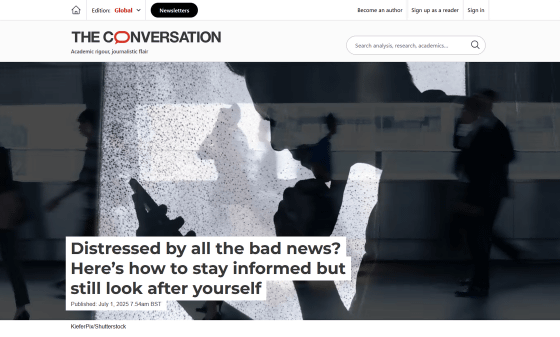Experts give advice on how to avoid the mental health effects of watching too much bad news

The act of continuing to follow news reporting tragic wars, incidents, accidents, etc. on social media is called '
Distressed by all the bad news? Here's how to stay informed but still look after yourself
https://theconversation.com/distressed-by-all-the-bad-news-heres-how-to-stay-informed-but-still-look-after-yourself-259913

The human brain is wired to react quickly to danger in order to prioritize safety and survival, and even just seeing bad news can trigger that reaction, so if your brain is repeatedly activated by seeing bad news, it can become mentally exhausting.
Previous research has shown that watching negative news can lead to feelings of anxiety, uncertainty, and instability, which can lead to poor mental health. Also, watching a lot of tragic news can lead to vicarious trauma , which causes traumatic reactions such as flashbacks and sleep disorders even to events that you have not experienced.
However, people do not 'stop watching bad news because it makes me feel negative,' and a 2023 study found that negative emotions actually promote online news consumption. Also, if you have friends or acquaintances in areas affected by conflict or disaster, you need to get information from the news and keep an eye on the situation.
Even if you have no personal connection to it, being informed of a tragic event, making sense of what's happening, and using it to motivate positive action is a moral decision, which is why Shabahan doesn't believe simply blocking out all news is a possible or practical response.

Instead of shutting out the news, Shabahan recommends a 'mindful approach' -- paying attention to your emotional changes, noticing how the news makes you feel, and reducing the frequency of your news viewing if necessary. Here are some tips for mindfulness:
◆1: Stop and take a few deep breaths
Before watching the news, it is important to take a moment to observe your physical and mental sensations.
◆2: Check your situation
If you are nervous before watching the news, have important plans, are already feeling anxious, or are mentally overwhelmed, you may not be ready to receive bad news. If you feel like you are not ready, it is recommended that you postpone watching the news until you are calm.
◆3: Reflect on your motivations and goals
Instead of just mindlessly continuing to watch the news, being conscious of your motivations and what you are trying to find out when watching the news may help prevent you from endlessly watching bad news.

◆4: Maintain a critical perspective
When reading news articles or watching videos, you should check the reliability of the source and the level of detail of the information, and avoid being swayed by news of questionable origin.
◆5: Be aware of the impact stress has on you
If you're experiencing effects like tension, sweating or restlessness, it may be best to cut back on watching the news as these may be signs of stress.
6. Take your time
Instead of watching one news item and then immediately moving on to the next, it's important to take the time to process the information you received and your reaction. Shabahan recommends thinking about how the news has changed your emotions, thoughts, and attitudes, whether your purpose for watching the news has been achieved, and whether you have the energy to continue consuming more news.
It's difficult to always follow all of the above advice when watching the news, but if you can be even just a little bit more considerate when you're seeing bad news, you'll be able to make more calm decisions about how to interact with the news.

Shabahan lists some signs that bad news is affecting mental health, including being unable to stop watching bad news, feelings of hopelessness, helplessness and lack of motivation, irritability, difficulty concentrating, fatigue, severe physical symptoms such as stomach upset, sleep problems and an increase in behaviours that would not occur in a calmer state, such as panic buying or hoarding.
If you notice these signs, you should take a break, whether it's a few minutes or a few days, until your emotions have stabilized and you can return to the news. While you're away from the news, it's effective to interact with supportive people around you and do activities you enjoy. Shabahan advised that occasionally going outside to garden or doing manual work such as painting or sewing can help ease anxiety and emotional conflict.
in Web Service, Science, Posted by log1h_ik